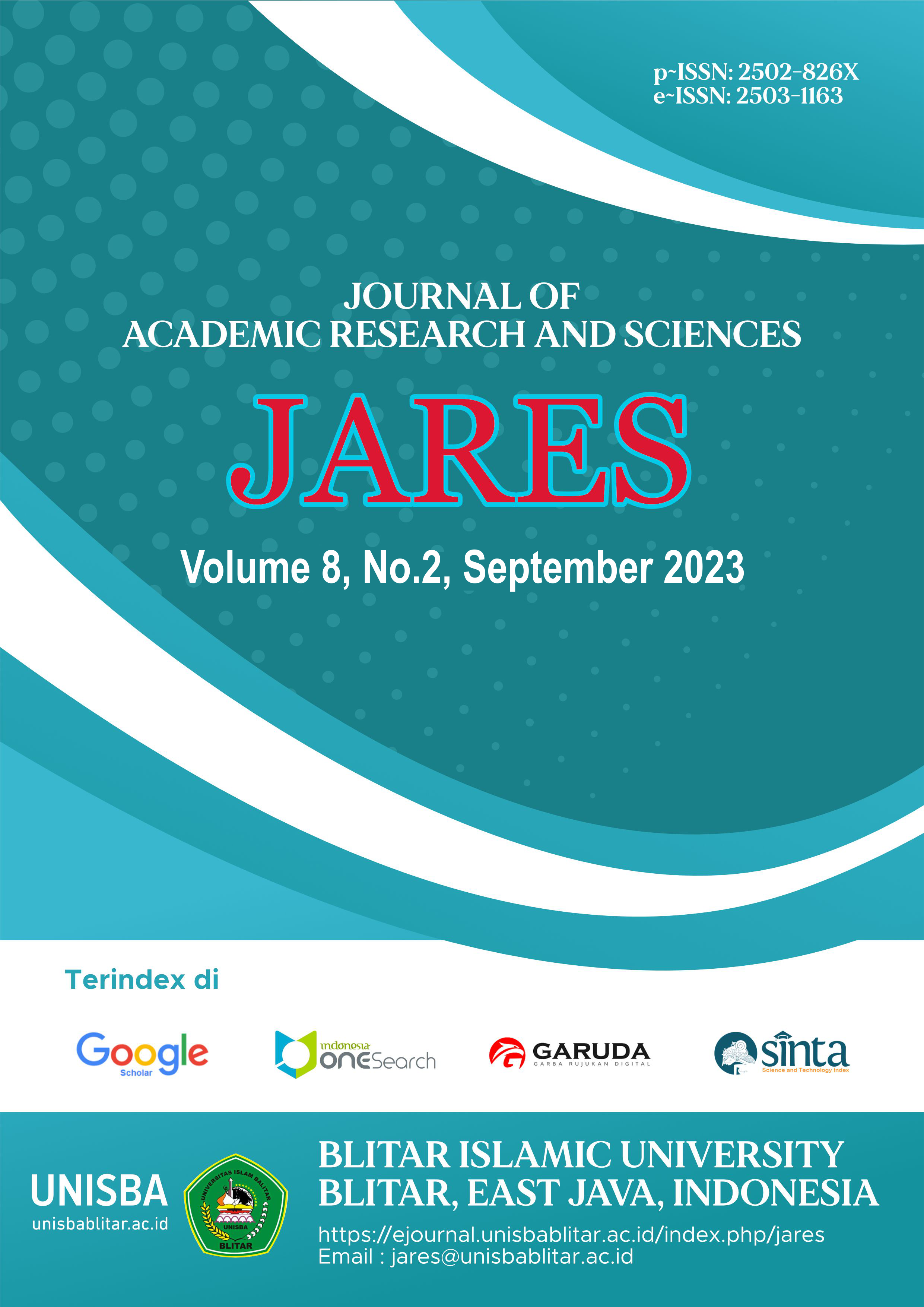THE UTILIZATION OF DUOLINGO TO BOOST STUDENTS’ GRAMMAR MASTERY IN SENIOR HIGH SCHOOL
DOI:
https://doi.org/10.35457/jares.v8i2.3034Keywords:
Duolingo, Grammar, Reported SpeechAbstract
This classroom action research utilized Duolingo to enhance the grammar mastery of 31 senior high school students in Reported Speech. The research procedures cover; planning, acting, observing, and reflecting. The researchers collected data through tests. The results demonstrated a significant improvement in students' grammar of Reported Speech mastery, with test average scores increasing from 56.77 to 85.16. Regarding the result, teachers are suggested to integrate technology-based learning tools like Duolingo to create engaging and interactive learning environments and enhance students‘ mastery. However, it is important to note that individual student progress varied, and some students showed more substantial improvements compared to others. Further analysis and consideration of factors such as individual learning styles, frequency of Duolingo usage, and additional instructional support may help understand the variations in student performance.
Downloads
References
Y. Wulandari and D. Fadhilawati, “Developing Adobe Flash as a Learning Media To Increase the First Grade
Students’ Speaking Achievement at Junior High School in the 2018/2019 Academic Years,” Josar, vol. 1, no. 1,
pp. 84–95, 2019.
D. Fadhilawati, A. Khan, D. L. Rachmawati, and M. Mansur, “Tackling and Handling Students ’ Grammar
Mastery on Passive Voices in a Higher Education : Quizzes Application Power,” Veles, vol. 6, no. 2, pp. 379–
, 2022.
E. C. Sioco and P. V. De Vera, “Grammatical competence of Junior High School students,” TESOL Int. J., vol. 13,
no. 2, pp. 82–94, 2018.
A. Rossiter, “The importance of Grammar,” Limguapress, 2021.
https://linguapress.com/grammar/importance-of-grammar.htm.
P. Kumar Debata, “The Importance of Grammar in English Language Teaching: A Reassessment,” Lang. India
www.languageinindia.com, vol. 13, no. 5, 2013, [Online]. Available: www.languageinindia.com.
R. E. Putri, “The Relationship Among Students’ Reading Strategy, Grammar Awareness and Their Reading
Comprehension,” Universitas Islam Syarif Hidayatullah Jakarta, 2022.
D. S. Dewi, “Grammatical Knowledge : Does It Affect Listening Comprehension ?,” Anglo-Saxon, vol. 8, no. 2,
pp. 152–157, 2017.
M. R. Aziz, D. Fadhilawati, and N. Sutanti, “The Effectiveness of Quizizz Application to Increase Students’
Grammar Achievement,” in 7th ELTT Conference, 2021, pp. 179–189.
D. Fadhilawati, “Improving the Students’ Grammar Achievement on Conditional Sentences by Using
Memrise,” Langlit An Int. Per-Reviewed Open Access J., vol. 5, no. 4, pp. 83–95, 2019.
C. D. Miranti, “Students ’ Difficulties in Learning Reported Speech,” Universitas Islam Negeri Ar- Raniry Banda
Aceh, 2020.
L. Camille Davalos Perez, “English Language Acquisition Via Duolingo Application: Effectivity and
Challenges,” J. English Teach. Stud., vol. 2, no. 2, pp. 76–87, 2020.
M. F. Zamzami, The Effect of Using Duolingo Application Through Students’ Vocabulary Mastery. 2019.
Fauzan and U. Kasim, “Exploring the Implementation of Duolingo Media for Assignment in Learning
English,” English Educ. J., vol. 11, no. 2, pp. 288–301, 2020.
A. Habibie, “Duolingo as an Educational Language tool to Enhance EFL Students’ Motivation in Learning
English,” British, J. Bhs. dan sastra Ingg., vol. 9, no. 1, pp. 13–26, 2020.
A. N. Cesarini, N. Sulaiman, S. S. Mulyana, and V. Yolandri, “Utilizing Duolingo in Learning Vocabulary,” in
Proceedings International Conference on Education of Suryakancana 2021, 2021, pp. 109–117.
U. J. Rosyidah, E. D. Laksmi, M. Anugerahwati, U. N. Malang, U. N. Malang, and U. N. Malang, “Gamification in
Duolingo App on Improving English Listening Proficiency of JuniorHigh School Students,” ENGLISH Fr. Acad.
J. English Lang. Educ., vol. 7, no. 1, pp. 119–132, 2023, doi: 10.29240/ef.v7i1.5377.
Y. Dearestiani, A. Rohman, and W. S. Pane, “Improving Students ’ Speaking Skills by Using Duolingo
Application,” Inq. Jpurnal, vol. 01, no. 02, pp. 155–162, 2023.
S. Khasinah, “Classroom Action Research,” Pionir, vol. 1, no. 1, pp. 107–114, 2013, [Online]. Available:
D. Fadhilawati, “Learning and Reviewing Vocabulary Through Memrise To Improve Students’ Vocabulary
Achievement,” JARES., vol. 1, no. 2, p. 4, 2016, doi: 10.30957/jares.v1i2.419.
M. Mansur and D. Fadhilawati, “Enhancing the Students’ Grammar Achievements of Conditional Sentences
By Using Quizizz Platform in Senior High School,” JARES (Journal of Academic Research. and Science., vol. 6,
no. 2, pp. 1–10, 2021, [Online]. Available: https://ejournal.unisbablitar.ac.id/index.php/jares.

Downloads
Published
Issue
Section
License
Authors who publish with this journal agree to the following terms:
- Copyright on any article is retained by the author(s).
- Author grant the journal, right of first publication with the work simultaneously licensed under a Creative Commons Attribution License that allows others to share the work with an acknowledgement of the work’s authorship and initial publication in this journal.
- Authors are able to enter into separate, additional contractual arrangements for the non-exclusive distribution of the journal’s published version of the work (e.g., post it to an institutional repository or publish it in a book), with an acknowledgement of its initial publication in this journal.
- Authors are permitted and encouraged to post their work online (e.g., in institutional repositories or on their website) prior to and during the submission process, as it can lead to productive exchanges, as well as earlier and greater citation of published work.
- The article and any associated published material is distributed under the Creative Commons Attribution-ShareAlike 4.0 International License













